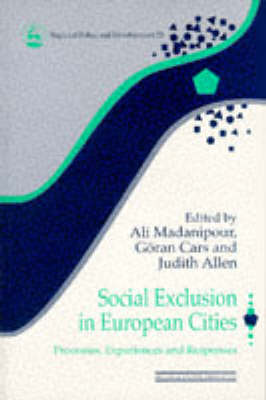Regional Policy & Development S.
1 primary work
Book 23
Social Exclusion in European Cities
by Ali Madanipour, Goran Cars, and Judith Allen
Published 15 June 1998
This study defines what is meant by "social exclusion" in terms of its causes, how it is experienced and the way in which policy and community initatives are confronting the problem. It is argued that developments in the structure of the global economy, resulting in investment in certain areas, have intensified social polarization and exclusion. The symptoms of "social exclusion" include long-term unemployment; informalization of work; a widening gap in levels of income, education and health; and changing family structure. This is heightened, asserts the editor, by planning and housing policies, which often create whole neighbourhoods of disadvantaged people. Comparative studies of communities responding to social exclusion lead to proposals for urban regeneration schemes linking housing with employment as part of a Europe-wide initiative to combat the problem.
